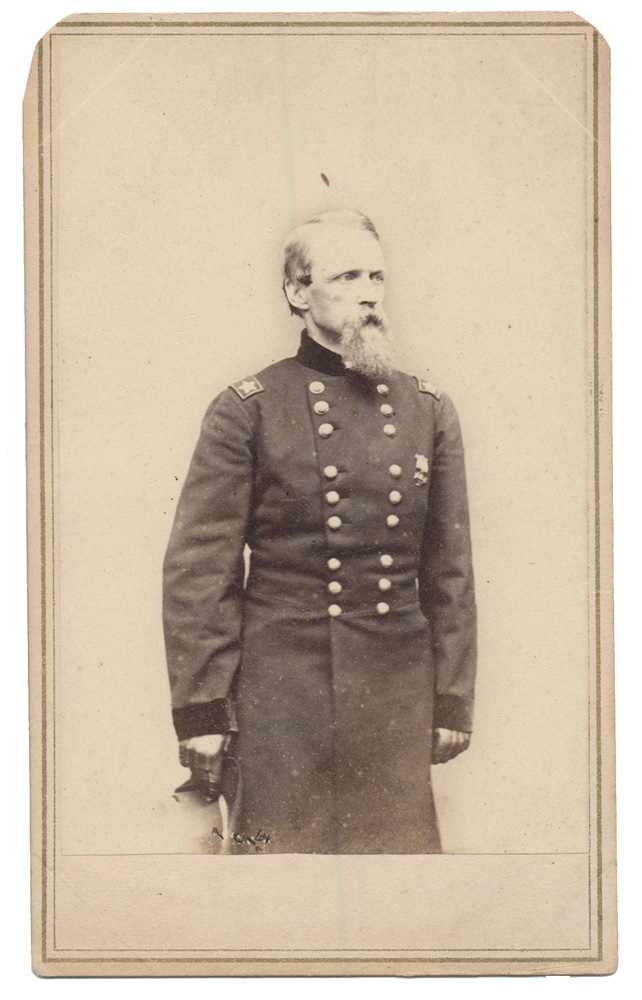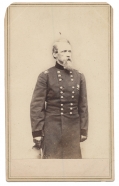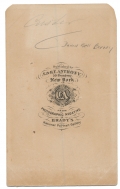site search
online catalog
STANDING VIEW CDV OF MAJOR GENERAL DAVID B. BIRNEY

$175.00 SOLD
Quantity Available: None
Item Code: 523-102
Image shows Birney in the uniform of a major general. He wears a double-breasted frock coat and holds a just visible slouch hat in his right hand by his side. Attached to the left breast of his coat is a Kearny Medal.
Image is clear and clean with excellent contrast. Top mount corners are clipped.
Reverse has back mark for E. & H. T. ANTHONY FROM A BRADY NEGATIVE. Revers also has an old pencil inscription that reads “CUSTER.” This is followed by a more modern inscription in pencil that reads “DAVID BELL BIRNEY.”
David Bell Birney was born on May 29, 1825 in Huntsville, Alabama, the son of an abolitionist from Kentucky. In 1833 the family returned to their native Kentucky and freed their slaves. In 1835, the family moved to Cincinnati, where Birney’s father published an anti-slavery newspaper. Following numerous threats from pro-slavery mobs, the family moved once more, this time to Michigan, and finally to Philadelphia.
Following his graduation from Phillips Academy, Andover, Massachusetts, David Birney entered business, studied law, and was admitted to the bar. He returned to Philadelphia, practicing law from 1856 until the outbreak of the Civil War.
Just after Fort Sumter in April of 1861, Birney was commissioned as lieutenant colonel of the 23rd Pennsylvania Volunteers, a unit he raised largely at his own expense. Just prior to the war he had been studying military texts in preparation for such a role. He was promoted to colonel on August 31, 1861, and to brigadier general on February 17, 1862, clearly benefiting from political influences, not military merit. He commanded a brigade in Brig. Gen. Philip Kearny's division of the III Corps, which he led through the Peninsula Campaign. At the Battle of Seven Pines he was accused of disobeying an order from his corps commander, but this was simply a matter of orders misunderstood. Birney was court-martialed, but with strong positive testimony from Kearny, he was acquitted and restored to command.
Birney then led his brigade in the Seven Days Battles, primarily at Glendale. He fought at the Second Battle of Bull Run and at the Battle of Chantilly immediately following. When Kearny was killed in the latter battle, Birney took over command of his division. Stationed in Washington, D.C., he missed the Battle of Antietam, but his division returned to the Army of the Potomac to fight at Fredericksburg. There, he once again encountered military discipline problems, this time for allegedly refusing to support Maj. Gen. George G. Meade's division's attack on the left flank of the Union line. However, he was complimented in III Corps commander Maj. Gen. George Stoneman's official report for "the handsome manner in which he handled his division" on that same day and for a second time he escaped punishment. Birney led his division in heavy fighting at Chancellorsville, where they suffered more casualties (1,607) than any other division in the army. As a result of his distinguished service at Chancellorsville, he was promoted to major general on May 20, 1863.
At the Battle of Gettysburg, Confederate divisions of John B. Hood and Lafayette McLaws slammed into the III Corps, and Birney's division, hit on three sides, was completely demolished in the fighting with severe casualties. As Birney watched the few survivors of his division gather about him on Cemetery Ridge, he whispered to one of his officers, "I wish I were already dead." Despite having received two minor wounds himself, Birney assumed temporary command of the III Corps after Major General Daniel Sickles was wounded. Birney remained in temporary command of the III Corps until the more senior General William H. French was named permanent commander.
Birney started the 1864 Overland Campaign as a division commander in the II Corps, his III Corps having been disbanded that spring. After good service in the Wilderness, Spotsylvania Court House (where he was wounded by a shell fragment), and Cold Harbor, Lt. Gen. Ulysses S. Grant gave Birney command of the X Corps in the Army of the James on July 23, 1864.
During the Siege of Petersburg, Birney became ill with diarrhea. At first, this was a minor complaint and he was able to remain in command, but in September his health started to get worse. However, Birney was reluctant to take a leave of absence and so tried to remain on duty. On October 7, he was so sick that he had to be transported in an ambulance. The corps medical director requested that Birney be sent home at once, and he was taken to Philadelphia, where he became delirious. The doctors diagnosed his condition as typhomalaria, and he died on October 18 1864 after experiencing uncontrollable gastrointestinal bleeding. The exact cause of Birney's death has been speculated to be typhoid fever. He was buried in Woodlands Cemetery in Philadelphia. [ad]
~~~~~~~~~~~~~~~~~~~~~~~~~~~~~~~~~
THIS ITEM, AS WITH ALL OTHER ITEMS AVAILABLE ON OUR WEB SITE,
MAY BE PURCHASED THROUGH OUR LAYAWAY PROGRAM.
FOR OUR POLICIES AND TERMS,
CLICK ON ‘CONTACT US’ AT THE TOP OF ANY PAGE ON THE SITE,
THEN ON ‘LAYAWAY POLICY’.
THANK YOU!
Inquire About STANDING VIEW CDV OF MAJOR GENERAL DAVID B. BIRNEY
For inquiries, please email us at [email protected]
Most Popular
Historical Firearms Stolen From The National Civil War Museum In Harrisburg, Pa »
Theft From Gravesite Of Gen. John Reynolds »
Cavalry Carbine Sling Swivel »
Fine Condition Brass Infantry Bugle Insignia »
featured item
CAVALRY OFFICER’S SABRE IDENTIFIED TO CAPTAIN MARCUS A. MOORE, 1ST MASSACHUSETTS CAVALRY
Manufactured: Newark, NJ Maker: Sauerbier, Henry Year: Early Civil War Model: Model 1840 transitional with 1860 style grip Size: 34.2 inch blade, 1.17 wide, .353 thick This sword has all true Type 1 features with the exception of the Model 1860 style… (870-159). Learn More »




